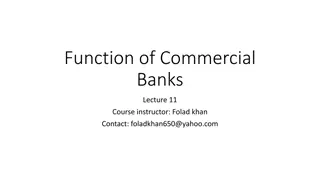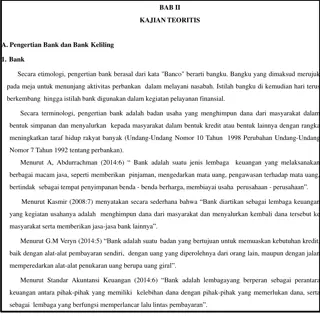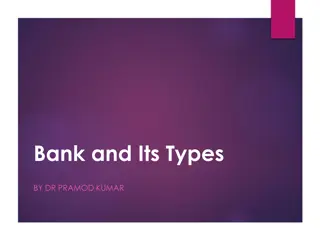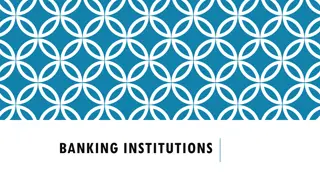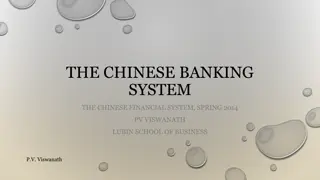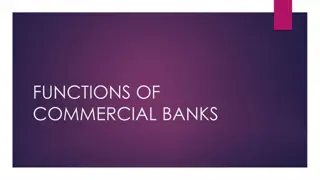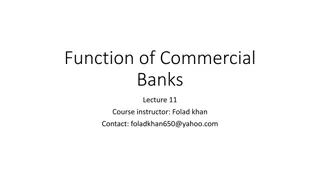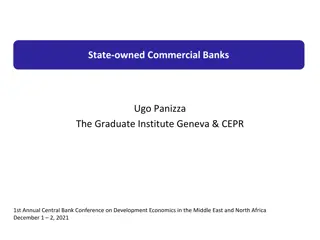Functions of Commercial Banks Explained
Commercial banks provide a range of services beyond their primary functions, acting as agents for customers in collection and payment of credit, purchase and sale of securities, trustee and executor roles, remittance of money, and representation and correspondence. Additionally, they offer general utility services like locker facilities, acting as referees, issuing letters of credit, underwriting new issues, and acting as information banks by collecting and disseminating financial, economic, and statistical data.
Download Presentation

Please find below an Image/Link to download the presentation.
The content on the website is provided AS IS for your information and personal use only. It may not be sold, licensed, or shared on other websites without obtaining consent from the author.If you encounter any issues during the download, it is possible that the publisher has removed the file from their server.
You are allowed to download the files provided on this website for personal or commercial use, subject to the condition that they are used lawfully. All files are the property of their respective owners.
The content on the website is provided AS IS for your information and personal use only. It may not be sold, licensed, or shared on other websites without obtaining consent from the author.
E N D
Presentation Transcript
II. Secondary Functions Agency Functions A. Banks render a number of useful services to the customers apart from performing the primary functions. Commercial banks act as agents of their customers in following ways- Collection and Payment of Credit: The commercial banks collect and pay the various negotiable instruments like cheques, bills of exchange, promissory notes, hundies etc. Barks also make payment on behalf of the customers like payment of rents, Income tax, fees, Insurance premium etc. Purchase and Sale of Securities: The modern commercial banks also undertake the purchase and sale of various securities like shares, stocks, bonds units and debentures etc. on behalf of the customers. Banks perform the functions of a broker and do not give any advice regarding the suitability of a security. 1. 2.
3. Trustee and Executor : Banks also act as trustees and executors of the property of their advice. Banks undertake administration of will or settlements and trusteeship functions through its expert staff and specialised departments. Sometimes banks also undertake income-tax services on behalf of the customer. 4. Remittance of Money: Banks also remit money from one place to the other. The commercial banks remit funds on behalf of customer from one place to another through telegraphic transfer etc. 5. Representation and Correspondence: Sometimes commercial banks act as representatives and/or correspondents of the clients, especially in obtaining passports, travel tickets, booking of vehicles, plots etc. cheques, drafts, mail transfers,
B. General Utility Services Banks provide many more utility services in addition to agency services- Locker Facilities: Banks provide locker facilities to their customers. People can keep their gold or silver jewellery or other important documents in these lockers at a very nominal annual rent. In this way bank accepts the valuable articles and documents for safe custody. Acting as a Referee : Banks also act as a referee. Banks give information about the economic position of their customers to domestic and foreign traders. Bank can be referred by the third parties for getting information regarding the financial position of the Customer. The bank will act as referee only if it is desired by the customer, otherwise the secracy maintained very carefully. 1. 2. of a customer's account is
3. Issuing Letter of Credit: Letter of credit is a very popular document in foreign trade. Banks certify the credit worthiness of his customers in a way by issuing letter of credit. Issuing of letter of credit to their customers to enable them to go abroad. 4. Acting as Underwriters: Banks also underwrite the new issues of Government and Corporate bodies for a commission. The name of a bank as an underwriter encourages investors to have faith in the shares of company. 5. Acting as Information Banks: Commercial banks also act as information bureau as they collect the financial, economic and statistical data relating to industry, trade and commerce. The information is made available to various interested parties.
6. Issuing of Traveller's Cheques : Banks have been rendering great service by issuing traveller's cheques which enable a person to travel without fear of theft or loss of money. Now, some banks have started credit card system under which a credit card holder is allowed to avail credit from the listed outlets without any additional cost or effort. So, a credit card holder need not to carry cash all the time. 7. Issuing of Gift Cheques: Certain banks issue gift cheques of various denominations e.g. some Indian banks issue gift cheques of the denominations of Rs. 11, 21, 31, 51.101, 501, etc. These are generally issued free of charge.
8. Dealing in Foreign Exchange: Major commercial banks also transact business of foreign exchange Commercial banks are the main authorized dealers of foreign exchange in India. 9. Merchant Banking Services: merchant banking services to the customers. They help in availing loans from non-banking financial institutions. However, in recent past most of the banks have transferred the merchant banking services to their separate subsidiaries. through their main branches. Commercial banks also render












